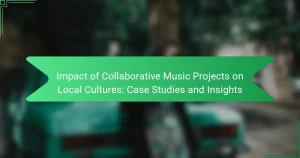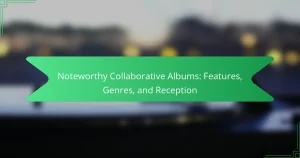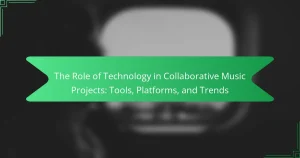Cross-cultural music festivals enhance cultural understanding and foster community engagement through diverse musical traditions. This article explores key features such as genres, international artists, and interactive experiences. It examines regional differences in festival styles and highlights notable events like the Global Citizen Festival and WOMAD. Additionally, it offers tips for maximizing your experience at these vibrant celebrations.
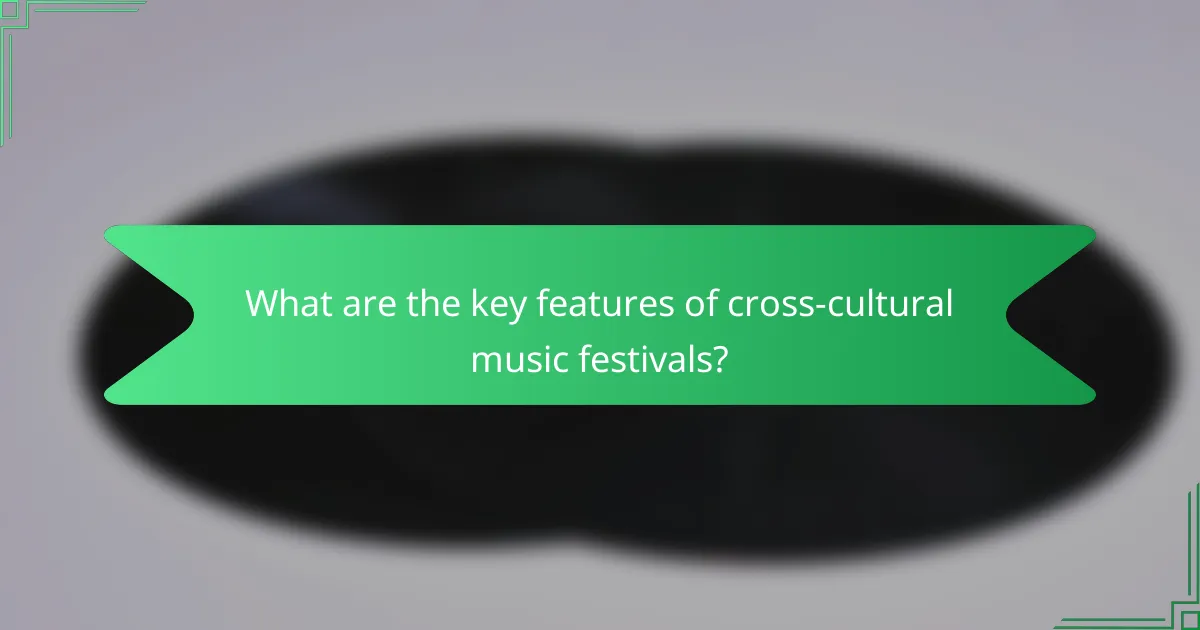
What are the key features of cross-cultural music festivals?
Cross-cultural music festivals showcase diverse musical traditions, promote cultural exchange, and foster community engagement. Key features include a variety of genres, international artists, and interactive experiences. Festivals often highlight local cuisine, art installations, and workshops that immerse attendees in different cultures. These events create a unique atmosphere that celebrates inclusivity and artistic expression.
How do these festivals promote cultural exchange?
Cross-cultural music festivals promote cultural exchange by showcasing diverse musical traditions and fostering collaboration among artists. These events create a platform for artists from various backgrounds to share their unique sounds, encouraging dialogue and understanding. Attendees experience different cultures through performances, workshops, and food, enhancing their appreciation for global diversity. Festivals often feature artists who blend traditional and contemporary styles, highlighting the evolution of cultural expressions. As a result, these gatherings strengthen community ties and inspire future collaborations across cultural boundaries.
Which genres of music are commonly featured?
Cross-cultural music festivals commonly feature genres such as world music, folk, jazz, reggae, electronic, and pop. These genres highlight diverse cultural expressions and attract a wide range of audiences. World music showcases traditional sounds from various countries, while folk emphasizes regional storytelling through song. Jazz often includes improvisation, creating unique performances. Reggae brings a rhythmic, laid-back vibe, and electronic music offers innovative soundscapes. Pop music, popular across demographics, adds mainstream appeal to these festivals.
What role do local artists play in these events?
Local artists play a crucial role in cross-cultural music festivals by showcasing diverse musical traditions. They enhance cultural exchange and foster community engagement. Their performances often reflect unique local sounds, contributing to the festival’s authenticity. Additionally, local artists create opportunities for collaboration, enriching the overall experience for attendees.
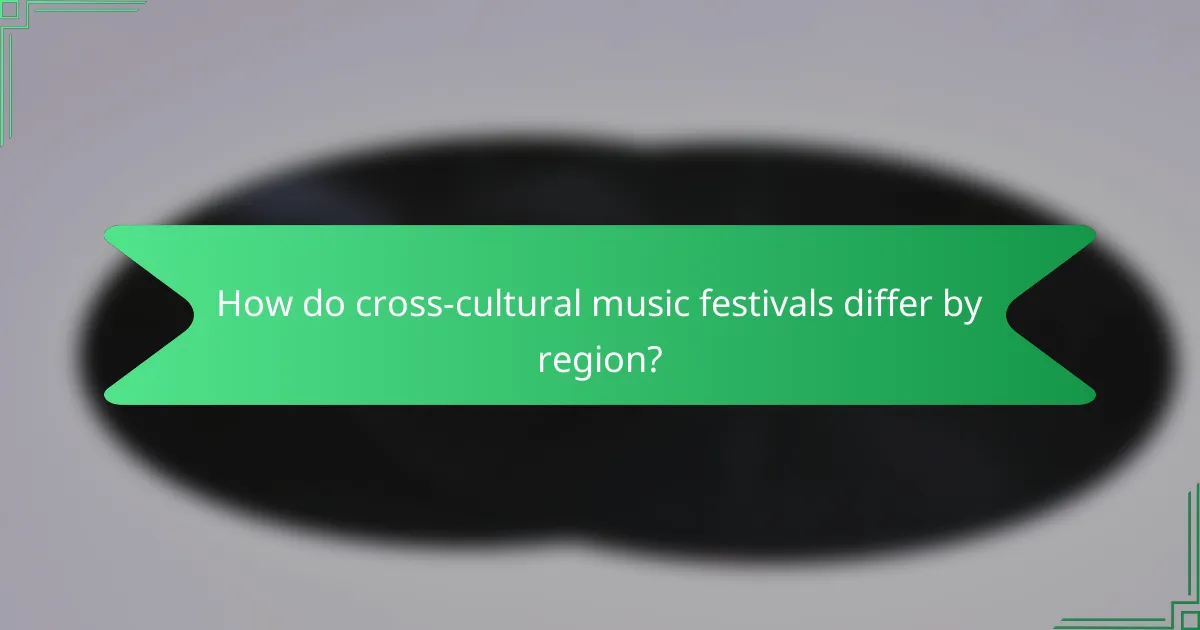
How do cross-cultural music festivals differ by region?
Cross-cultural music festivals differ significantly by region in terms of cultural influences, musical genres, and audience engagement. For instance, festivals in Europe often emphasize classical and folk traditions, while those in Asia might highlight traditional instruments and contemporary fusion styles.
North American festivals frequently showcase a blend of genres, including rock, hip-hop, and electronic music, reflecting the region’s diverse cultural landscape. In Africa, festivals often focus on community participation and storytelling through music, showcasing local artists and traditional rhythms.
Latin American festivals are characterized by vibrant celebrations and dance, emphasizing genres like salsa, reggaeton, and folk music. Each region’s unique attributes shape the festival experience, influencing everything from artist lineups to audience interactions.
What unique experiences do festivals in Europe offer?
Festivals in Europe offer unique experiences by showcasing diverse musical genres, cultural traditions, and interactive activities. These events create vibrant atmospheres where attendees can engage with artists and fellow festival-goers.
Notable examples include the Glastonbury Festival in the UK, known for its eclectic lineup and sustainability efforts, and Tomorrowland in Belgium, celebrated for its elaborate stage designs and immersive themes.
Additionally, festivals like Primavera Sound in Spain emphasize global music trends, featuring both established and emerging artists. This cross-cultural exchange fosters a sense of community and appreciation for different musical styles.
Experiencing these festivals often includes unique elements such as local cuisine, art installations, and workshops, enhancing the overall cultural immersion.
How do festivals in Asia highlight traditional music?
Festivals in Asia prominently showcase traditional music by featuring local artists and cultural performances. These events serve as platforms for preserving and promoting diverse musical heritage. For example, the Gion Matsuri in Japan highlights ancient folk songs, while the Bali Arts Festival showcases traditional Balinese gamelan music. Through workshops and live performances, attendees experience the rich history and unique sounds of various regions. Additionally, these festivals foster cross-cultural exchanges, allowing artists from different backgrounds to collaborate and innovate within traditional frameworks.
Which elements are characteristic of North American festivals?
North American festivals feature vibrant music, diverse cultures, and interactive experiences. They often showcase local and international artists, highlighting genres like folk, jazz, and electronic. Unique attributes include large-scale gatherings such as Coachella and smaller community events. Festivals emphasize inclusivity and celebrate regional traditions, creating a rich tapestry of artistic expression.
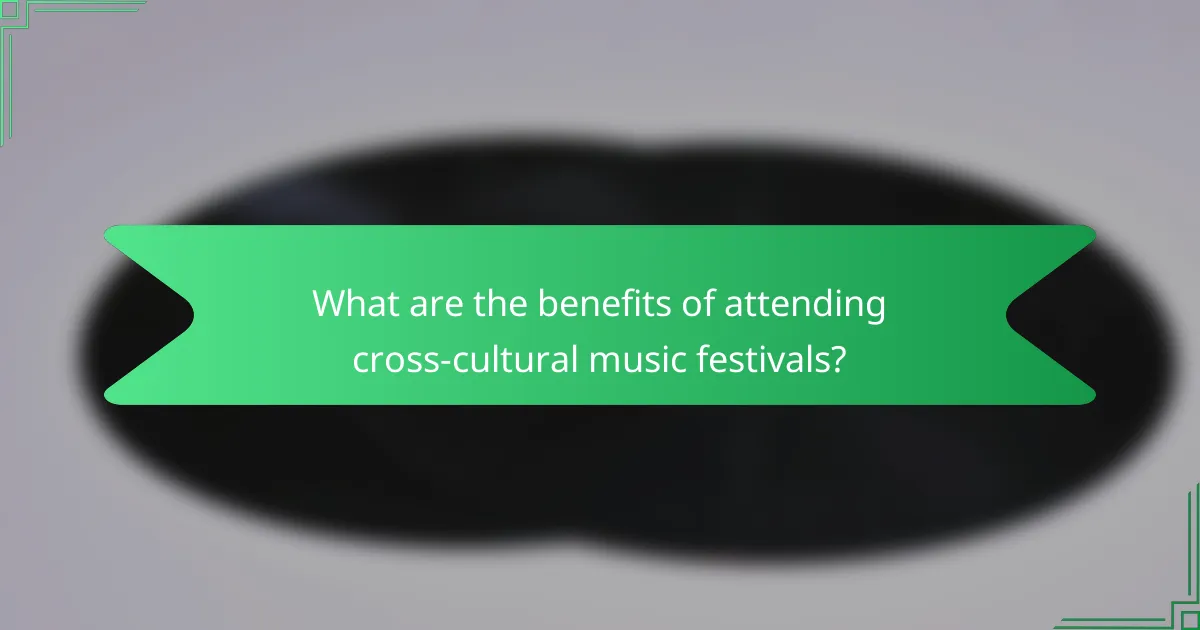
What are the benefits of attending cross-cultural music festivals?
Attending cross-cultural music festivals enhances cultural understanding, fosters community, and offers unique musical experiences. These events showcase diverse artists, promote collaboration, and provide opportunities for personal growth. Participants often gain insights into different traditions, enhancing their appreciation for global music. Additionally, such festivals encourage social connections, creating a sense of belonging among attendees.
How do these events enhance community engagement?
Cross-cultural music festivals enhance community engagement by fostering cultural exchange and collaboration. These events bring together diverse artists and audiences, creating a shared space for interaction. Participants experience unique musical traditions, promoting understanding and appreciation of various cultures. Additionally, local communities benefit economically through increased tourism and business opportunities, strengthening community ties.
Why are they important for preserving cultural heritage?
Cross-cultural music festivals are vital for preserving cultural heritage as they foster appreciation and understanding of diverse traditions. These events showcase unique musical styles, instruments, and performances that reflect the history and values of various communities. They create spaces for cultural exchange, allowing artists and audiences to connect and share stories. Additionally, participation in these festivals helps sustain traditional practices and encourages younger generations to engage with their cultural roots.
What are the economic impacts of these festivals?
Cross-cultural music festivals significantly boost local economies. They create jobs, increase tourism, and stimulate spending in various sectors. For example, festivals can generate millions in revenue through ticket sales, food, and merchandise. Additionally, they promote cultural exchange, enhancing community engagement and attracting international visitors. These economic benefits often lead to long-term growth in the host regions.
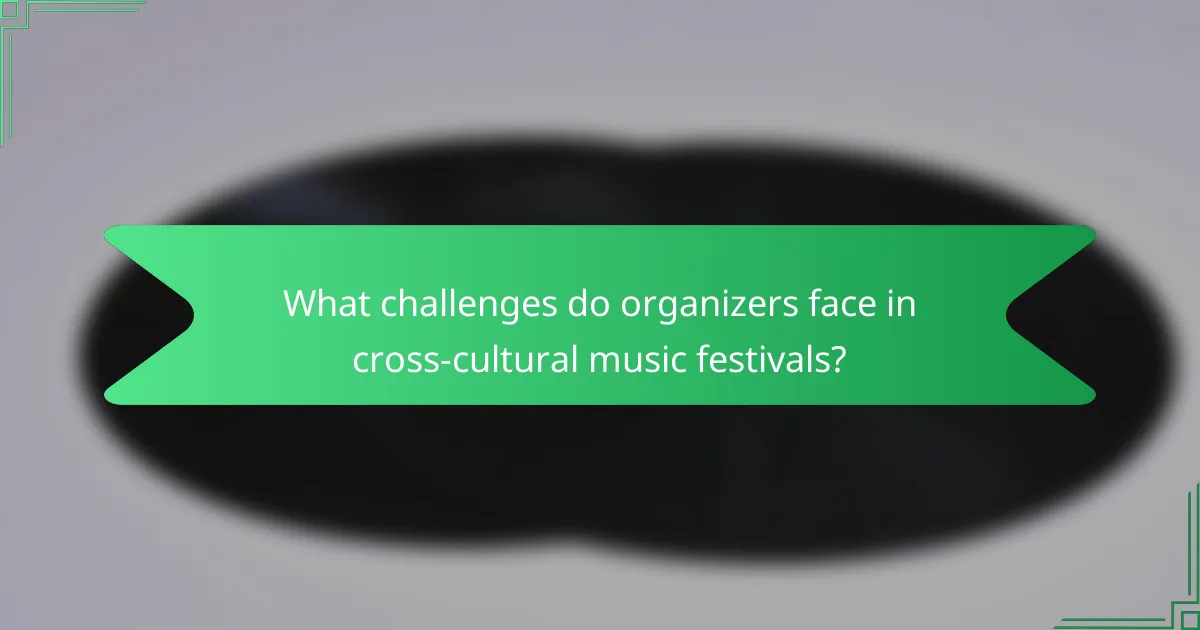
What challenges do organizers face in cross-cultural music festivals?
Organizers face challenges like cultural misunderstandings, logistical complexities, and audience engagement. These issues can lead to miscommunication and hinder the festival’s success. Cultural differences may affect programming choices, while logistics involve coordinating diverse artists and managing venue requirements. Engaging a varied audience requires thoughtful marketing and programming that respects all cultures represented.
How do logistical issues affect festival planning?
Logistical issues significantly impact festival planning by affecting scheduling, resource allocation, and attendee experience. Effective coordination ensures timely artist arrivals, stage setups, and crowd management. Poor logistics can lead to delays, safety concerns, and negative experiences for attendees. For instance, transportation challenges may hinder artist performances or cause supply shortages. Addressing these issues early enhances the overall success of cross-cultural music festivals.
What are the common cultural sensitivities to navigate?
Cultural sensitivities at cross-cultural music festivals often include respect for diverse traditions, awareness of local customs, and sensitivity to language differences. Attendees should avoid cultural appropriation and be mindful of varying interpretations of gestures. Understanding dietary restrictions and respecting religious practices are also crucial. Engaging with local artists fosters mutual appreciation and enhances the overall experience.
How can festivals ensure inclusivity and accessibility?
Festivals can ensure inclusivity and accessibility by implementing thoughtful planning and community engagement. They should involve diverse stakeholders, including individuals with disabilities, to identify specific needs. Accessible venues, transportation options, and clear communication of services enhance participation. Additionally, offering various forms of content, such as sign language interpretation and multi-language materials, supports broader engagement.
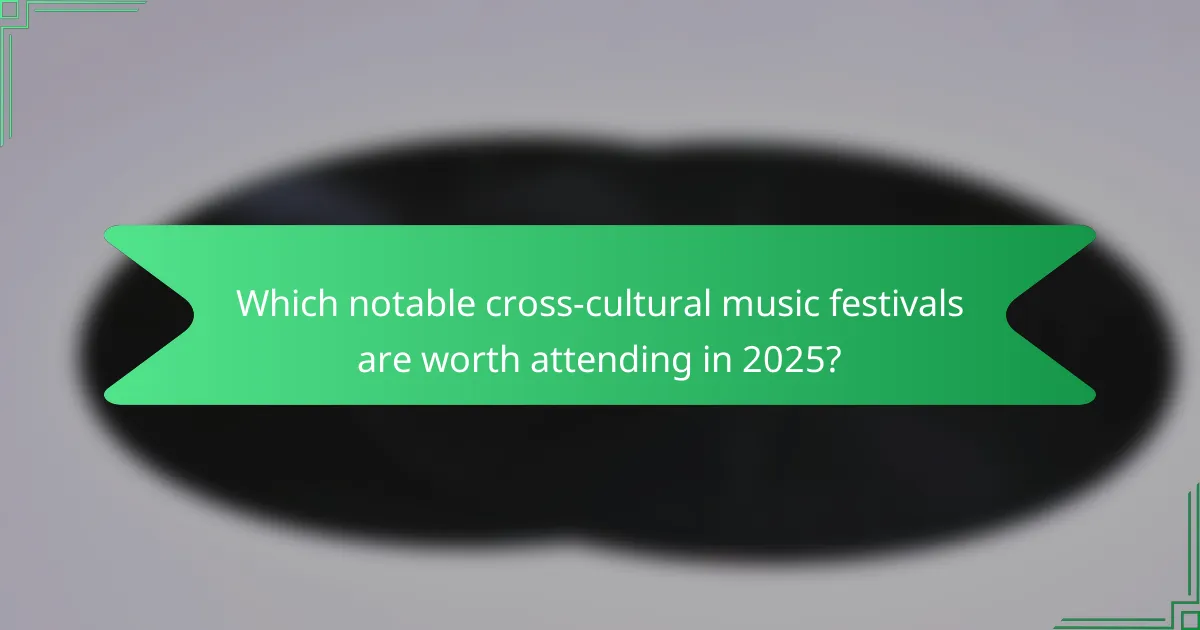
Which notable cross-cultural music festivals are worth attending in 2025?
Notable cross-cultural music festivals to attend in 2025 include the Global Citizen Festival, WOMAD, and the Montreal International Jazz Festival. Each festival showcases diverse artists and unique cultural experiences.
The Global Citizen Festival promotes social change through music, featuring global artists and advocacy initiatives. WOMAD (World of Music, Arts and Dance) celebrates international music and arts, attracting performers from various cultures. The Montreal International Jazz Festival, one of the largest jazz festivals, offers a blend of jazz, blues, and world music, creating a vibrant atmosphere for attendees.
These festivals provide opportunities to experience unique cultural expressions and connect with diverse communities through music.
What makes the festival in South America stand out?
The festival in South America stands out for its vibrant cultural fusion and diverse musical styles. Unique attributes include the incorporation of indigenous sounds, contemporary genres, and collaborative performances. These elements create immersive experiences that reflect the region’s rich heritage. Festivals often feature renowned artists and local talent, enhancing cross-cultural connections. The vibrant atmosphere and community engagement make these events memorable and impactful.
How does the festival in Africa celebrate diversity?
The festival in Africa celebrates diversity through music, dance, and cultural exchange. These events showcase local and international artists, fostering unity among various ethnic groups. They highlight traditional instruments and genres, enriching the cultural tapestry. Festivals often include workshops and discussions, promoting understanding and appreciation of different cultures. This unique approach enhances community bonds and encourages collaboration among diverse populations.
What innovations are being introduced in European festivals?
European festivals are introducing innovations such as virtual reality experiences, eco-friendly initiatives, and diverse artist lineups. These advancements enhance audience engagement and promote sustainability. For example, festivals like Tomorrowland are utilizing augmented reality to create immersive environments. Additionally, many festivals are adopting zero-waste policies to minimize environmental impact. The integration of technology and sustainability reflects a growing trend in the festival landscape.

How can attendees maximize their experience at these festivals?
Attendees can maximize their experience at cross-cultural music festivals by planning ahead, engaging with artists, and exploring diverse offerings. First, research the lineup and schedule to prioritize must-see performances. Second, participate in workshops and interactive sessions to immerse in different cultures. Third, connect with fellow attendees to share experiences and discover new music. Lastly, indulge in local cuisine and crafts to enrich the overall festival experience.
What tips can enhance cultural appreciation during the event?
To enhance cultural appreciation during cross-cultural music festivals, engage with diverse artists and explore their backgrounds. Participate in workshops that highlight traditional music practices and storytelling. Attend panel discussions to gain insights into cultural significance and historical contexts. Taste authentic cuisine offered at the festival to experience cultural flavors.
How to prepare for diverse musical styles and performances?
To prepare for diverse musical styles and performances, immerse yourself in the cultural backgrounds of the genres. Research artists and their influences to understand their unique sounds. Attend workshops or masterclasses to gain hands-on experience. Collaborate with musicians from different backgrounds to expand your versatility. Finally, practice regularly to refine your skills and adapt to various musical contexts.
What common mistakes should festival-goers avoid?
Festival-goers should avoid common mistakes to enhance their experience. Prioritize planning, staying hydrated, and respecting the environment.
1. Neglecting to plan ahead can lead to missing performances.
2. Failing to stay hydrated may result in fatigue or health issues.
3. Ignoring festival rules can result in being removed from the venue.
4. Overpacking can make mobility difficult and hinder enjoyment.
5. Disregarding personal safety can lead to dangerous situations.
6. Not engaging with local culture can diminish the overall experience.
